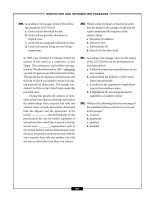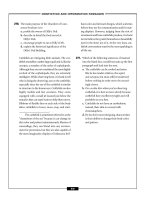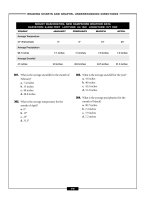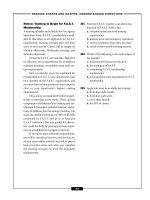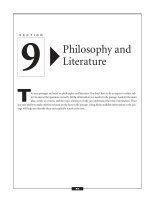2016 chinhphuc unit01 reading skill
Bạn đang xem bản rút gọn của tài liệu. Xem và tải ngay bản đầy đủ của tài liệu tại đây (284.73 KB, 4 trang )
Khóa ‘CHINH PHỤC MỌI KỲ THI TIẾNG ANH’ 2016 – GV Hồng Hạnh
Facebook: HongHanhIELTSMoon.vn
CHINH PHỤC MỌI KỲ THI TIẾNG ANH
UNIT 1: READING SKILL
VIDEO và LỜI GIẢI CHI TIẾT chỉ có tại website MOON.VN
[Truy cập tab Tiếng Anh – Khóa: Chinh phục mọi kỳ thi tiếng Anh]
PART 1: TEST SKILLS
Exercise 1:
The decade began with serious plans to explore the German
Battleship Ostfriesland, a wreck lying a long way offshore in 380ft
of water. During a milestone wreck diving operation, Gentile, Pete
Manchee and Ken Clayton made a single Heliox dive each to the
wreck using custom decompression tables designed by Dr Bill
Hamilton. The way now had been set; Gentile had shown that these
previously inaccessible sites were now slowly becoming a
possibility. In 1991, the late Captain Bill Nagle and John Chatterton
led a team of experienced amateur shipwreck divers on an expedition to explore an unknown wreck at a
site approximately 77 meters of water. The general appearance was that of a World War II era submarine
wreck. On subsequent dives, it was discovered that there were human remains abroad the wreck, but the
identity of the mysterious “U-Who” would not be confirmed as that of U-869 until nearly six years later.
Which of the following is the best title for the paragraph?
(A) German ship
(B) The wreck
(C) A battleship
Exercise 2:
In the philosophy of John Dewey, a sharp distinction is made between “intelligence” and “reasoning”.
According to Dewey, intelligence is the only absolute way to achieve a balance between realism and
idealism, between practicality and wisdom of life. Intelligence involves “interacting with other things and
knowing them,” while reasoning is merely the act of an obsever, “…a mind that beholds or grasps objects
outside the world of things…” With reasoning, a level of mental certainty can be achieved, but it is
through intelligence that control is taken of events that shape one‟s life.
What is the topic of this paragraph?
(A) The intelligence of John Dewey
(B) Distinctions made by John Dewey
(C) Dewey‟s ideas on the ability to reason
(D) How intelligence differs from reasoning in Dewey‟s works
Exercise 3:
Nitrogen fixation is a process by which nitrogen is continuously fed into biological circulation. In this
process, certain algae and bacteria convert nitrogen into ammonia (NH3). This newly created ammonia is
then for the most part absorbed by plants.
Moon.vn – Học để khẳng định mình
1
Hotline: 0432 99 98 98
Khóa ‘CHINH PHỤC MỌI KỲ THI TIẾNG ANH’ 2016 – GV Hồng Hạnh
Facebook: HongHanhIELTSMoon.vn
The opposite process of denitrification returns nitrogen into the air. During the process of denitrification,
bacteria cause some of the nitrates from the soil to convert into gaseous nitrogene or nitrous oxide (N2O).
In this gaseous form the nitrogen returns to the atmosphere.
What is the passage about?
(A) The process of nitrogen fixation
(B) Two nitrogen processes
(C) The return of nitrogen into the air
(D) The effect of nitrogen on plant life
Exercise 4:
Education over the past 100 years
A. The education of our young people is one of the most important aspects of any community, and
B.
C.
D.
E.
ideas about what and how to teach reflect the accepted attitudes and unspoken beliefs of society.
These ideas are local stoms and attitudes change, and these changes are reflected in the
curriculum, teaching and assessment methods, and the expectations of how both students and
teachers should behave.
Teaching in the late 1800s and 1900s was very different from today. Rule for teachers at the time
in the USA covered both the teachers‟ duties and their conduct out of class as well. Teachers at
that time were expected to set a good example to their pupils and to behave in a very virtuous and
proper manner. Women teachers should not marry, nor should they „keep company with men‟.
They had to wear long dresses and no bright colours and they were not permitted to dye their hair.
They were allowed to loiter downtown in an ice cream store, and women were not allowed to go
out in the evenings unless to a school function, although men were allowed one evening a week to
take their girlfriends out if they went to church regularly. No teachers were allowed to drink
alcohol. They were allowed to read only good books such as the Bible, and they were given a pay
increase of 25c a week after five years of work for the local school.
As well as this long list of „dos‟ and „don‟ts‟, teachers had certain duties to perform each day. In
country schools, teachers were required to keep the local bucket full for the classroom fire and to
bring a bucket of water each day for the children to drink. They had to make the pens for their
students to write with and to sweep the floor and keep the classroom tidy. However, despite this
list of duties, little was stipulated about the content of the teaching, nor about assessment
methods.
Teachers would have been expected to teach the three „r‟s – reading, writing, and arithmetic – and
to teach the children about Christianity and read from the Bible every day. Education in those
days was much simplier than it is today and covered basic literacy skills and religious education.
They would almost certainly have used corporal punishment such as a stick or the strap on
naughty or unruly children, and the children would have sat together in pairs in long rows in the
classroom. They would have been expected to sit quietly and to do their work, copying long rows
of lettes or doing basic math sums. Farming children in country areas would have had only a few
years of schooling and would probably have left school at 12 or 14 years of age to join their
parents in farm work.
Compare this with a country school in the USA today! If you visited it today, you would see the
children sitting in groups round large tables, or even on the floor. They would be working
together on a range of different activities, and there would almost certainly be one or more
computers in the classroom. Children nowadays are allowed and even expected to talk quietly to
Moon.vn – Học để khẳng định mình
2
Hotline: 0432 99 98 98
Khóa ‘CHINH PHỤC MỌI KỲ THI TIẾNG ANH’ 2016 – GV Hồng Hạnh
Facebook: HongHanhIELTSMoon.vn
each other while they work, and they are also expected to ask their teachers questions and to
actively engage in finding out information for themselves, instead of just listening to the teacher.
F. There are no rules of conduct for teachers out of the classroom, and they are not expected to
perform caretaking duties such as cleaning the classroom or making pens, but nevertheless their
jobs are much harder than they were in the 1900s. teachers today are expected to work hard on
planning their lessons, to teach creatively, and to stimulate children‟s minds, and there are strict
protocols about assessment across the whole of the USA. Corporal punishment is illegal, and any
teacher who hit a child would be dismissed instantly. Another big difference is that most state
schools in western countries are secular, so religious teaching is not part of the curriculum.
G. These changes in educational methods and ideas reflect changes in our society in general.
Children in western countries nowadays come from all parts of the globe and they bring different
cultures, religions, and beliefs to the classroom. It is no longer considered acceptable or
appropriate for state schools to teach about religious beliefs. Ideas about the value and purpose of
education have also changed with the increasing sophistication of workplaces and life skills
needed for a successful career, the curriculum has also expanded to try to prepare children for the
challenges of a diverse working community. It will be interesting to see how these changes
continue into the future as our society and culture grows and develops.
Choose the correct heading heading for each paragraph, A – G, from the list of headings below.
Write the letter of the paragraph beside the heading.
..... 1. Teaching content in the past
..... 2. Teaching in the present
..... 3. Rules for teachers in the past
..... 4. The importance of educational beliefs
..... 5. Changes in teaching and in society
..... 6. Teaching duties in the past
..... 7. Rules for teachers in the present
PART 2: STUDY SKILLS
SQ3R method
Survey
Predicting
Skimming
Question
Brainstorming a question list
Listing expectations
Read
Read one section at a time
Take note
Recall
After each section
Connecting ideas & Reflecting questions in step 2
Review
After finishing reading: reread the text / notes
Summarizing / reflecting
Moon.vn – Học để khẳng định mình
3
Hotline: 0432 99 98 98
Khóa ‘CHINH PHỤC MỌI KỲ THI TIẾNG ANH’ 2016 – GV Hồng Hạnh
Facebook: HongHanhIELTSMoon.vn
READING REVIEW FORM
Title:
Source:
Date of retrieval:
Author:
Length:
Time of reading:
General topic:
What is the problem/issue?
What conclusion is reached?
Summary:
Do you like the reading? Why/Why not?
Moon.vn – Học để khẳng định mình
4
Hotline: 0432 99 98 98



